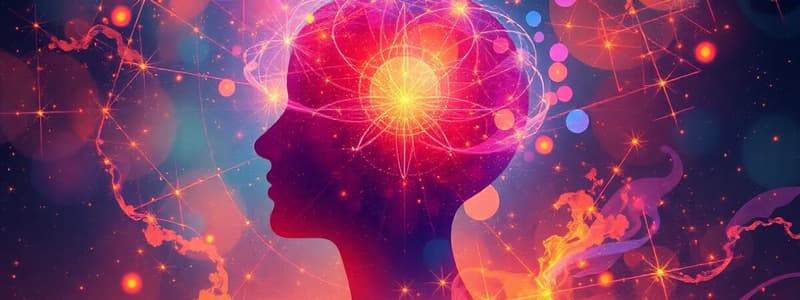Podcast
Questions and Answers
Que é a intelixencia emocional e cales son os seus principais compoñentes?
Que é a intelixencia emocional e cales son os seus principais compoñentes?
A intelixencia emocional (EQ) é a capacidade de entender e xestionar as propias emocións e influír nas emocións dos outros. Os principais compoñentes son a autoconciencia, a autorregulación, a motivación, a empatía e as habilidades sociais.
Como se define a autoconciencia dentro da intelixencia emocional?
Como se define a autoconciencia dentro da intelixencia emocional?
A autoconciencia é a capacidade de recoñecer e comprender as propias emocións, fortalezas, debilidades e valores, así como o impacto que estas teñen sobre os demais.
Cal é unha das principais vantaxes da intelixencia emocional?
Cal é unha das principais vantaxes da intelixencia emocional?
Mellores relacións e conexións sociais.
Cal é a importancia da autorregulación na intelixencia emocional?
Cal é a importancia da autorregulación na intelixencia emocional?
Que papel xoga a empatía na intelixencia emocional?
Que papel xoga a empatía na intelixencia emocional?
Que importancia ten a auto-reflexión no desenvolvemento da intelixencia emocional?
Que importancia ten a auto-reflexión no desenvolvemento da intelixencia emocional?
Como se manifestan as habilidades sociais dentro do contexto da intelixencia emocional?
Como se manifestan as habilidades sociais dentro do contexto da intelixencia emocional?
Como a escoita activa contribúe á intelixencia emocional?
Como a escoita activa contribúe á intelixencia emocional?
Por que é importante aprender dos erros no contexto da intelixencia emocional?
Por que é importante aprender dos erros no contexto da intelixencia emocional?
Quais son algúns métodos para xestionar o estrés que melloran a intelixencia emocional?
Quais son algúns métodos para xestionar o estrés que melloran a intelixencia emocional?
Cal é a diferenza principal entre a intelixencia emocional e o coeficiente intelectual?
Cal é a diferenza principal entre a intelixencia emocional e o coeficiente intelectual?
Que papel xoga a comunicación na intelixencia emocional?
Que papel xoga a comunicación na intelixencia emocional?
Por que é esencial o compromiso para desenvolver a intelixencia emocional?
Por que é esencial o compromiso para desenvolver a intelixencia emocional?
Flashcards
Intelixencia Emocional (EQ)
Intelixencia Emocional (EQ)
A capacidade de entender e xestionar as propias emocións, e de recoñecer e influír nas emocións dos demais.
Autoconsciencia
Autoconsciencia
Coidado consciente dos teus propios sentimentos, puntos fortes, puntos débiles, valores e como impactas nos demais.
Autorregulación
Autorregulación
Xestionar as emocións e impulsos de forma efectiva, como controlar os sentimentos negativos, adaptarse a circunstancias cambiantes e manter a calma.
Motivación
Motivación
Signup and view all the flashcards
Empatía
Empatía
Signup and view all the flashcards
Autocoñecemento
Autocoñecemento
Signup and view all the flashcards
Habilidades sociais
Habilidades sociais
Signup and view all the flashcards
Liderado
Liderado
Signup and view all the flashcards
Toma de decisións
Toma de decisións
Signup and view all the flashcards
Resiliencia
Resiliencia
Signup and view all the flashcards
Study Notes
Introduction to Emotional Intelligence
- Emotional intelligence (EQ) is the ability to understand and manage one's own emotions, and to recognize and influence the emotions of others.
- It encompasses several key components, including self-awareness, self-regulation, motivation, empathy, and social skills.
Components of Emotional Intelligence
-
Self-awareness: Recognizing and understanding one's own emotions, strengths, weaknesses, values, and impact on others.
- This involves accurately identifying feelings as they occur and understanding their source.
- It includes recognizing the impact of emotions on thoughts and behavior.
-
Self-regulation: Managing one's emotions and impulses effectively.
- This involves controlling negative emotions, adapting to changing circumstances, and maintaining composure under pressure.
- It includes delaying gratification and taking responsibility for actions.
-
Motivation: Embracing a strong drive and commitment to achieve goals, and displaying initiative and optimism.
- This involves maintaining a positive attitude even in the face of setbacks and pursuing one's objectives persistently.
- It emphasizes self-discipline, commitment, and a high level of energy to pursue goals.
-
Empathy: Understanding and sharing the feelings of another person, putting oneself in their shoes.
- This involves recognizing and appreciating the perspectives, feelings, and needs of others.
- It includes actively listening, showing compassion, and responding thoughtfully to different situations.
-
Social skills: Managing relationships effectively, communicating clearly and persuasively, and building strong rapport with others.
- This involves building relationships, working collaboratively in groups, handling conflict effectively, influencing and motivating others constructively, and negotiating solutions.
- It includes effectively communicating needs and desires, and resolving disagreements amicably.
Benefits of High Emotional Intelligence
- Enhanced relationships and social connections
- Improved communication and conflict resolution skills
- Increased resilience and stress management abilities
- Stronger leadership skills and better teamwork
- Greater self-confidence and motivation
- Increased job satisfaction and success
- Improved decision-making and problem-solving skills
- Reduced interpersonal conflicts and improved interpersonal dynamics
How to Develop Emotional Intelligence
- Self-reflection: Regularly examining your emotions and behaviors is crucial for self-awareness and self-regulation.
- Active listening: Truly listening to others to understand their perspectives and empathize with their feelings.
- Seeking feedback: Asking for and receiving feedback from trusted sources can provide valuable insights.
- Practice self-compassion: Treating yourself with the same kindness and understanding you would extend to others will help regulate emotions.
- Stress management techniques: Using strategies to manage stress will increase emotional stability and self-regulation.
- Learning from mistakes: Acknowledging and learning from past mistakes builds emotional resilience and helps in self-improvement.
- Developing strong communication skills: Learning to express emotions appropriately and actively listening to others is crucial for empathy.
Differences between Emotional Intelligence and other related concepts
- Emotional intelligence is distinct from Intelligence Quotient (IQ). While IQ assesses cognitive abilities, emotional intelligence focuses on non-cognitive skills of managing emotions and relating to others.
- Emotional intelligence exhibits some correlation to certain types of intelligence. For example, some individuals demonstrating high emotional intelligence in specific contexts may also display high mental acuity.
Conclusion
- Emotional intelligence is a crucial skill in today's world.
- It is essential for personal and professional success.
- Developing emotional intelligence is an ongoing process requiring self-awareness, practice, and a dedication to improvement.
Studying That Suits You
Use AI to generate personalized quizzes and flashcards to suit your learning preferences.




